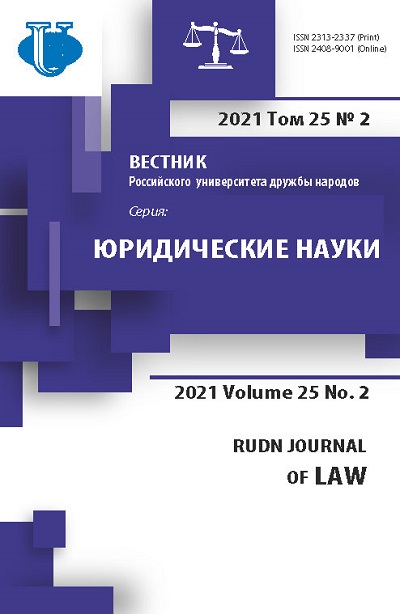National Green Finance Standard in Russia 2020 - a Breakthrough in Green Finance Regulations?
- Authors: Ermakova E.P.1
-
Affiliations:
- Peoples’ Friendship University of Russia (RUDN University)
- Issue: Vol 25, No 2 (2021)
- Pages: 562-581
- Section: CIVIL LAW
- URL: https://journals.rudn.ru/law/article/view/26714
- DOI: https://doi.org/10.22363/2313-2337-2021-25-2-562-581
Cite item
Full Text
Abstract
The article is devoted to the analysis of VEB.RF's “Methodological Recommendations for Green Finance” published on July 13, 2020, named by many Russian experts as the National Green Finance Standard of Russia. This document was in-tended to define the criteria for “green” projects and financial instruments for enterprises and banks and, ultimately, describe the architecture of the national sys-tem of such financing. A similar document - “Taxonomy Regulation” - was adopted in the European Union on June 18, 2020. In this regard, a comparative analysis of the above issues is of particular importance. The purpose of the article is to form the idea of the national standard of “green” finance in Russia based on the analysis of regulations and scientific sources. The applied methods are empirical methods of comparison, description, interpretation, and theoretical methods of formal and dialectical logic. The following private scientific methods were used: legal-dogmatic and the method of interpretation of legal norms. The study showed that the main financial regulator in Russia is the Central Bank, and it is the regulatory documents of the Central Bank of the Russian Federation that should create a national standard for green financing. Without the approval of the Central Bank, VEB.RF’s guidelines are turning into just another methodology of the rating agency.
About the authors
Elena P. Ermakova
Peoples’ Friendship University of Russia (RUDN University)
Author for correspondence.
Email: ermakova_ep@rudn.ru
ORCID iD: 0000-0001-5722-3641
Candidate of Legal Science, Associate Professor of Civil Procedural Law of Department of Civil Law and Civil Procedure and Private International Law, Law Institute
6 Miklukho-Maklaya str., Moscow, 117198, Russia FederationReferences
- Dudin, M.N., Frolova, E.E., Protopopova, O.V., Mamedov, A.A. & Odintsov, S.V. (2019) Study of innovative technologies in the energy industry: nontraditional and renewable energy sources. Entrepreneurship and Sustainability Issues. 6 (4), 1704-1713.
- Dudin, M.N. Frolova, E.E., Artemeva, Yu.A., Bezbakh, V.V. & Kirsanov, A.N. (2016) Problems and perspectives of BRICS countries transfer to «green economy» and law-carbon energy industry. International Journal of Energy Economics and Policy. 6 (4). 714-720.
- Dudin, M.N., Frolova, E.E., Kucherenko, P.A., Samusenko, T.M. & Voikova, N.A. (2016) Creating an Effective System of Education to Prepare Future Human Resources within the Context Provided by the Global Shift toward a “Green Economy”. International Journal of Environmental and Science Education. 11 (15), 8706-8717.
- Duwe, M. et al. (2020) Climate Laws in Europe. Good Practices in Net-Zero Management. European Climate Foundation. Available at: https://europeanclimate.org/content/uploads/2020/02/04-02-2020-climate-laws-in-europefull-report.pdf [Accessed 30th Junuary 2020].
- Ermakova, E. P. (2020) The development of the legal framework for “green” finance in Russia, the EU and China: a comparative legal analysis. RUDN Journal of Law. 24 (2), 335-352. doi: 10.22363/2313-2337-2020-24-2-335-352 (in Russian).
- Frolova, E.E. (2020) The new European union financial market ecosystem: digitalization and sustainability. RUDN Journal of Law. 24(3), 673-694. doi: 10.22363/2313-2337-2020-24-3-673-694 (in Russian).
- Frolova, E.E. (2019) Legal regulation of green finance in China: successes and development challenges. Eurasian Law Journal. (7), 103-108. (in Russian).
- Gargaro, C. et al. (2019) EU Sustainable Finance Regulation. White & Case LLP. Available at: https://www.whitecase.com/sites/default/files/2019-06/eu-sustainable-finance-regulation.pdf [Accessed 20th January 2021].
- Humphreys, N. (2020) The EU Taxonomy for sustainable finance: FAQs for financial market participants 2020. Bloomberg Finance L.P. Available at: https://www.bloomberg.com/professional/blog/the-eu-taxonomy-for-sustainable-finance-faqs-for-financial-market-participants/ [Accessed 30th June 2020].
- Khabrieva, T.Ya. & Kurbanova, R.A. (eds.) (2019) Legal framework for countering corruption: international and national standards and initiatives. T. 1. Moscow, Prospekt Publ. (in Russian).
- Kemfert, C. & Schmalz, S. (2019) Sustainable finance: political challenges of development and implementation of framework conditions. Green Finance. 1(3), 237-248. doi: 10.3934/GF.2019.3.237
- Moisio, M. et al (2020) Overview of recently adopted mitigation policies and climate-relevant policy responses to COVID-19: 2020 update. NewClimate Institute, PBL Netherlands Environmental Assessment Agency, International Institute for Applied Systems Analysis. Available at: https://newclimate.org/wp-content/uploads/2020/10/NewClimate_PBL-CLIMA_2020OctUpdate.pdf [Accessed 20th January 2021].
- Peng, H., Lu, X. & Zhou, Ch. (2018) Introduction to China’s Green Finance System. Journal of Service Science and Management. 11(01), 94-100. doi: 10.4236/jssm.2018.111009
- Piticchio, T. (2020) The integration and disclosure obligations on sustainability risks and factors in the UCITS and AIFs regulatory frameworks. European law blog. Available at: https://europeanlawblog.eu/2020/01/31/the-integration-and-disclosure-obligations-on-sustainability-risks-and-factors-in-the-ucits-and-aifs-regulatory-frameworks/ [Accessed 2nd February 2021].
- Schiappacasse, M. et al. (2020) Overview of the EU Taxonomy Regulation. Dechert LLP. Available at: https://www.dechert.com/knowledge/onpoint/2020/4/-overview-of-the-eu-taxonomy-regulation.html [Accessed 10th January 2021].
- Townsend, M. (2019) Sustainable finance: the EU taxonomy. Allen & Overy LLP. Available at: https://www.allenovery.com/en-gb/global/news-and-insights/publications/sustainablefinance-the-eu-taxonomy [Accessed 28th January 2021].
















